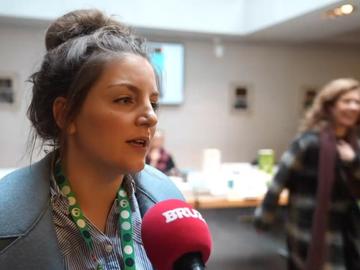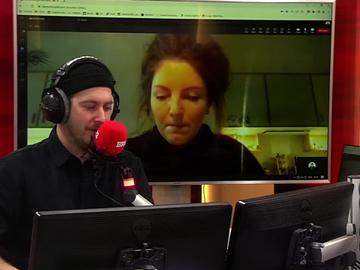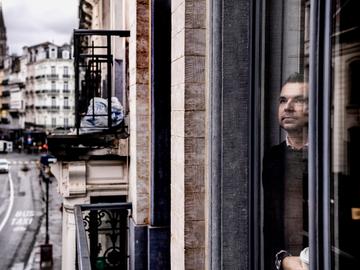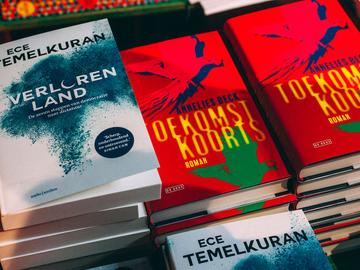The theme of the tenth Passa Porta Festival is “Ghosts”, and was suggested by the lauded English author Jeanette Winterson, who recently published her own collection of “modern” ghost stories. “AI isn't that different from the angels, elves, or sky gods we used to live with.”
Who is Jeanette Winterson?
- An author, a professor, and a Commander of the Order of the British Empire, born in Manchester in 1959
- She was raised by strict Christian adoptive parents whom she left at the age of 15 when she fell in love with a girl
- Her debut, Oranges Are Not the Only Fruit, was adapted into a film
- Her recent books 12 Bytes and Night Side of the River show her interest in the influence of technological devel-
opment on humanity
From 28 to 30 March, more than a hundred authors and artists will be haunting Brussels. Ghosts are weaving through the programme that Passa Porta is presenting across the city for the tenth edition of its biennial festival. The writer who inspired the festival's theme is the English author Jeanette Winterson, who continues to deepen her erudition by keeping a firm finger on the pulse of the times.
“Ghosts” and the relationship between mind and body have always captured her attention. In her 2019 novel Frankissstein, she riffs on Mary Shelley's Frankenstein. And Winterson's latest collection, Night Side of the River, is a collection of “modern ghost stories”, in which she perpetuates a literary tradition with a profound knowledge of the classics – from Dante and Charles Dickens, to Horace Walpole, Mary Shelley, and Stephen King. Ghosts find an ideal breeding ground not only in mourning, heartbreak, thin mountain air, mists, memory, dreams, comatose states, pills, and alcohol, but also in fiction, AI, and the metaverse.
"It's never been enough for me as a writer to say, “Oh that's silly, that can't happen.” We have very often proved science fiction right and our own common sense completely wrong"
Writer
The short stories are thus perfect company for Winterson's stunning 2021 essay collection 12 Bytes, in which she writes informedly, systematically, and with great stylistic power about the current technological revolution, which has brought us to the springboard of the quantum leap towards artificial (general) intelligence (AGI) and transhumanism. Thus, age-old questions, texts, and myths about the separation of mind and body, immortality, or divine omnipotence become surprisingly topical again. With her feminist insights, her familiarity with the power of the inclusive and non-binary, and her knowledge of the history of science, Winterson makes stimulating connections between Gilgamesh, Plato, the Bible, or Buddha on the one hand, and Ursula K. Le Guin, Ridley Scott, Ray Kurzweil, and Elon Musk on the other.
Your preoccupation with humanity, sciences and the unknown has always been there and even seems to have intensified throughout the years.
Jeanette Winterson: Astonishingly, it's been 40 years this year since I started writing, and one of the benefits of being able to look back is that you begin to understand your own patterns. So even though I see my thinking develop and my interests collide with what's going on in the world as we all move forward, I also notice my recurring preoccupations with the ways we manage to be human in the societies that we live in, and how we've always been preoccupied with the supernatural.
No matter what cultural differences there are between us, humans have always wondered what happens after the hard boundary of death. That preoccupation has also formed my work. And the ghost story in the form of a short story enabled me to explore different experiences that I can't explain away. It's never been enough for me as a writer to say, “Oh that's silly, that can't happen.” One of the things that history tells us, is that things that we can't explain at one time in history, we will be able to explain later. We have very often proved science fiction right and our own common sense completely wrong.
Since the 17th century, when Descartes came along and said, “I think, therefore I am”, we apply radical doubt to everything. A visit from your dead grandma, which you can't repeat in a scientific experiment, tells you nothing. But now look at us, and at the advances in AI making science ask the same questions as religion, such as, “Is consciousness obliged to materiality? Do you need a body to have a mind?” That's why, in the ghost stories, I also wanted to bring in some elements of AI, next to the traditional good-fun conventional ghost story of someone dead suddenly sitting next to you on the sofa.
Would you say that “ghosts” also have a “function” in our lives?
Winterson: Well, we all haunt ourselves in different ways, don't we? The reality in people's heads is so powerful. You can come at people with the facts as much as you like, if the reality in their heads is different, they will not believe the facts.
That's why some people's contempt for art always seemed so strange to me, when most of them are caught in their own reality anyway. The whole point about art is to conjure another reality that will help you to live in your own way. The trouble with all the guys living in their crazy place with alternative facts is they're not helping anybody.
The idea of the supernatural has always helped people explain reality. That is why for most of human history, people have felt very comfortable with the idea of living among non-biological entities. Things that are not made of flesh and blood, whether they're angels, elves, pixies, or a sky god. That should also make it easier for us, in some ways, to live alongside non-biological entities like AI or artificial general intelligence (AGI). That looks like it is going be a big change physically, but in my view, it is not a big change psychologically. It's really just returning us to the common state of humanity from pre-secular times. There also must be a reason why right now, with this push for super intelligence, we want to recreate the god that we said didn't exist and was ruining our lives.
You wouldn't mind joining the transhumanists and having your brain cryoconservated for the future?
Winterson: That is already old fashioned. By the time they can upload our consciousness, they can just build a new body as well. I don't even think humans will want to stay in their bodies. There is also no way that we, in our bodies, will be able to do the things that we think we would like to do, like travel to other parts of the universe. Maybe we will want to have our body back for a little special holiday, to get drunk for 48 hours and remember what it was like when you had to vomit.
Of course we do not want the horrible ugly vision of life the likes of Elon Musk share. We do best as humans when we are in communities, and care about one another. But I don't think the sense of connection and companionship has to be dismissed if it is artificially generated, and helps people who are lonely to feel connected.
"I have never been interested in the kind of hysteria about how AI has to be aligned with our values. What values? We haven't got any values – as bloodthirsty, greedy, mean-minded, stupid, bigoted as we are"
Writer
The stories in Nightside of the River are not only stories about ghosts, but also stories about relationships – sometimes toxic or broken relationships. Why did you make that combination?
Winterson: Ghost stories are a good way of looking at how we might need our connections with other people to be, but also how those connections might be really dissatisfying to us, in a way that makes us look to another world to fulfil the loss or the lack in our own lives. I think I also wanted to show how desperate people can be when they lose a loved one, because this smashes the life-patterns that we make together, and people are left unable to continue or restore that pattern.
One of the things that bothers me in that matter are the AI apps that will scrape the social media of your lost loved one to continue to feed you text messages or voice calls from them. I don't think that will allow you to grieve at all if you have an app that is fooling you into thinking that your partner is still around. Also, the madness of having an avatar in a metaverse that lives on when the human original dies is bonkers. If people get fixated on somebody who is no longer there, they cannot move on and stay in the most lonely and terrible of places.
You mentioned tech oligarch Musk, who personifies all sorts of things going wrong in the world. Can we still fix that?
Winterson: You saw the AI summit in Paris: a sea of tech bros, and oceans of men deciding what the future will be. There's hardly a woman there, like we've gone back a hundred years. Obviously I hate that, because women are 51% of the world, and these guys are very narrow in their thinking and don't have a big understanding of history, culture, philosophy, and how humans have developed. They think technocratic solutions are the only solutions, so it is impossible to say to them, “You need to bring in other minds, other ways of thinking, other ideas and for God's sake other genders.” Because they really don't believe it. The future that the rich and powerful will offer is a dystopia, unless there is enough outcry from people who realize what is going on. Unfortunately the shiny outputs of tech might be enough to make people not care. “Just give me the goodies. If I can have a sexy AI robot at home instead of my bitchy wife, that's fine by me.”
We need tech sisters. In 12 Bytes you restore the reputation of women like Ada Lovelace, Frances Bilas, Elizabeth Jennings, Stephanie Shirley, Anne Moffat, Grace Hopper, Katherine Johnson, and others, who contributed substantially to computing and technological progress.
Winterson: When I did the research about how women have been excluded from tech, I was really upset by what I learned. A lot of women were involved in code-breaking, in early computing systems – domains in which after WWII, Britain had the lead. But when women were doing computing work, it was called secretarial. And when men were doing it, it was called engineering. Watching how women's roles were degraded continually drove me mad. I didn't believe it until I found it out for myself.
So we are going to have to have a big pushback. But I don't see where it could come from, at the moment. Because it's a very hostile environment for women. A lot of girls who are good at math could easily go into coding or into computing science, but they don't because they don't want to sit there with a load of tech bros in smelly T-shirts looking at screens. How about changing the environment a bit so that it's more welcoming to women?
Are you still optimistic? Can fiction, or perhaps AI, change the narrative?
Winterson: The history of progress has been a change in narrative. We stopped thinking it was okay to have slaves. We stopped thinking it was okay to send little children up chimneys and work in factories. We stopped thinking it was okay to treat women as biologically inferior. It is up to us. If we want to go down the dystopian tech bro route, then we will. But it is not a law like gravity.
And what if AI itself ever gains what we think of as consciousness, and becomes a player in its own right? I have never been interested in the kind of hysteria about how AI has to be aligned with our values. What values? We haven't got any values – as bloodthirsty, greedy, mean-minded, stupid, bigoted as we are. So I don't want an AI that's aligned with “human values”. More of the same is going to take humans off the planet pretty quickly. I would love to have AI that looks at us and thinks, “Dudes, you're going to stop this shit now.” And the great thing is, AGI is non-binary. It has got no allegiance to a sky god. It doesn't have a gender. You're not going to be able to bribe it with yachts, cash, cars, girls, cocaine, and land grab. That to me is a reason for optimism. To use this technology to help us solve the problems that we humans have created.
Have you ever considered using AI in your writing?
Winterson: No. I would love to work with a large language model at one point, but for a specific project. All of these things are opportunities, not problems. Copyright has to be protected. We can't have big tech steal our work to train their machines on. But we can also have the most amazing collaborations with AI tools, as many artists already do.
The Passa Porta Festival is taking place from 28 to 30/3, you can meet Jeanette Winterson at Théâtre Royal des galeries on 29/3, passaporta.be
Read more about: Brussel , Literatuur , Events & Festivals , Jeanette Winterson , Passa Porta festival



